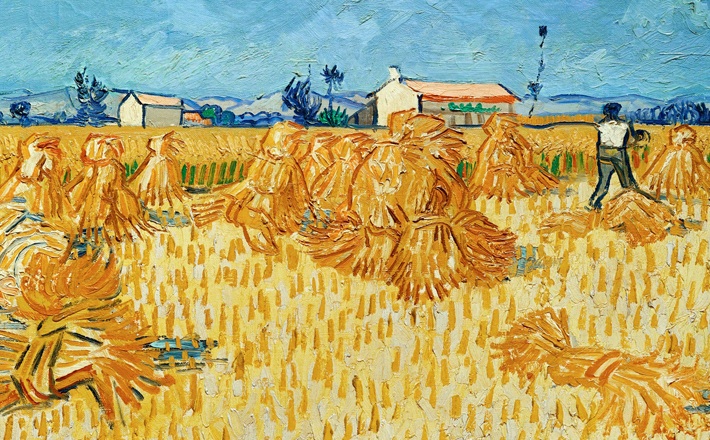Commentary on Galatians 6:[1-6] 7-16
The lectionary chooses both to make optional the first six verses in the chapter and to eliminate the final two verses, perhaps hoping to make the passage slightly less difficult to interpret.
That hope is not to be fulfilled. You may wish to include verses 1-6 and/or 17-18 in your preaching preparation for this text.
Verses 1-10 continue to explore what it means in a community to live by the Spirit over against the flesh. Paul’s words are powerful and challenging, laying out a dynamic that is very much not that of the way of the flesh or world. We’ll take a look at this section in just a moment. Then, verses 11-18 mark the ending of the letter almost literally, in that Paul calls upon his readers and hearers to look at the size of the letters he uses to create the postscript, as he does also in 1 Corinthians 16:21. Perhaps this is a way of emphasizing once again the points he has been trying to make.
For in Galatians 6:11-18, Paul again warns of the suspicious and unworthy motives of those who ask the new believers to be circumcised. He reminds his hearers that those who trouble them do not themselves keep the law. In ringing tones, he declares that there is something new in the world — new creation – and this is not an integration of two groups (the circumcised and the uncircumcised) but a new way for all God’s people to live together.
The letter ends with Paul’s own value as preacher and teacher underlined to support the value of his message and a final word of blessing. The lectionary divisions cut across the ordinary boundaries of the text. Instead of speculating about why that may be, let’s look at each section in turn to get at Paul’s meaning.
Verses 1-6 allow Paul to say more about what the life of people who live by the Spirit looks like. The list of virtues we saw in 5:22 are really all about relationships and how we manage life together. The baptized, those brought into ancient people of God in a new way are to fulfill a new law, that of Christ, by bearing one another’s burdens. Paul describes the radical mutuality of such a life. Assist one another and evaluate only yourself. Do what is given you to do on behalf of your neighbor, as God on behalf of God’s people did what needed to be done for them. By exhorting his hearers not to grow tired, Paul reminds us that this is indeed a hard way to live.
Such a life needs graciousness, perseverance, a constant cheerful sowing, and a refusal to judge who is worthy of help and who not. Such a life needs the Spirit’s presence surrounding and infusing it. It needs the presence of other persons so infused (the pneumatikoi in verse 1) to assist us when we falter.
Paul moves rather abruptly to call attention to his handwritten final words of admonition. He contrasts the motives of the would-be circumcisers (verses 12-13) with his own (verses 14-15). In doing so, he highlights again that the cross of Christ has utterly changed his — and by extension our — relationship to the world. The world (kosmos) is an amalgam of all the ways of the flesh that Paul has just dismissed for believers.
The old way is simply over; think back to Paul’s statement that we have been “rescued from the present age of evil” by God’s action in Christ. Now we are beyond old divisions as we live as God’s people: “new creation” (verse 15) is the way of the Spirit. It is the “next age.” It is where we live however imperfectly and in this new age we live by this “measure” (kanoni, verse 16), the “law of Christ” (6:2), namely that we bear one another’s burdens.
It’s almost a crazy project, isn’t it? To imagine that we human beings could eschew the measurements of value used in the everyday world? To imagine that human beings could devote themselves to one another’s well being, confident that there would be others who would care for them? To insist, especially now, twenty centuries later, that we are no longer under the powers of the “present age” but live and die under the aegis of God’s spirit? To imagine that God, through God’s body, bears our burdens?
All our best thinking, our most ardent scripture study, our personal experiences of God’s Spirit –all these must be brought into the mix as we seek to ponder what it means to “love your neighbor as yourself,” (Leviticus 19:18) or “do justice, love mercy, and walk humbly with your God” (Micah 6:8) or, simply, “show mercy” (Luke 10:37, paraphrased).
Yet it is to this project, this imagination empowered by the Spirit, that Paul summons us in no uncertain terms with the words “new creation.” How do we hear that Spirit? How do we grow our imagination of God’s new creation, elusive from the very start of human life in this world? And how might we function in such a way not given over to the standards of the flesh or the world?
There are no easy answers to this or the Galatians would probably have figured it out for themselves. There are no shortcuts or Paul would not have felt so strongly about turning back to the standards of (literally) an age gone by. The Gentiles did not need to become God’s people in the old ways: they had received the Spirit. As have we.
Perhaps the best way to fire our imaginations and live in accord with that spirit requires us to do the burden bearing more graciously. That is, we are privileged to hear one another’s dreams and desires, to continuously extend the tables at which we sit, the suppers we call Holy, to make room for folk who will see gifts and challenges that surprise us. In listening, in surprise, in hospitality for a moment we catch a richer glimpse of God’s reality and find the energy of the Spirit, lest we grow weary.


July 7, 2013